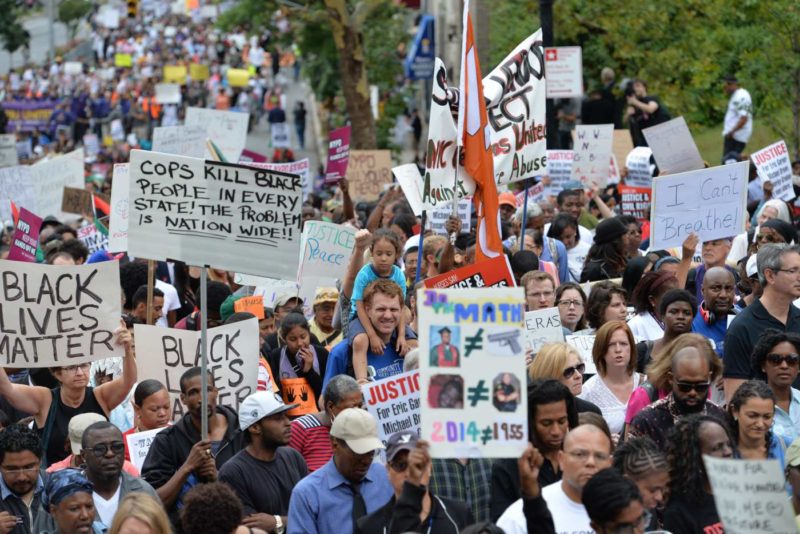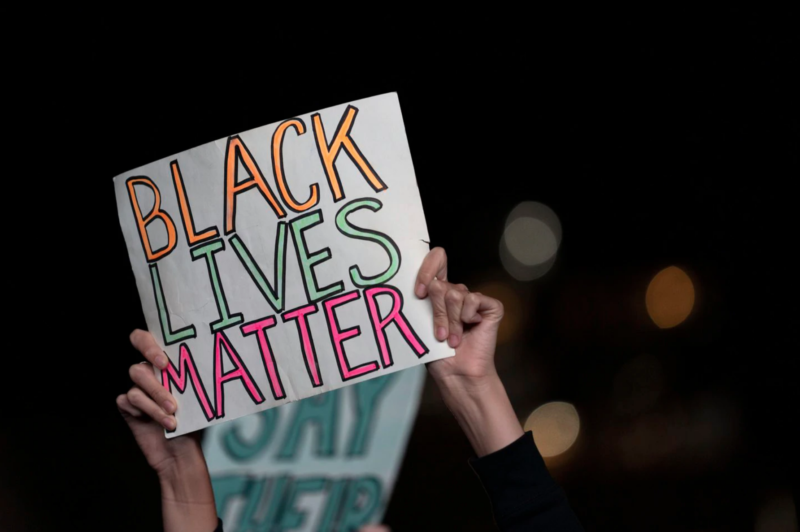Special News Series: Rising Up For Justice! – New survey says white support for BLM has slipped. Some historians say they’re not surprised.
Share
Explore Our Galleries
Breaking News!
Today's news and culture by Black and other reporters in the Black and mainstream media.
Ways to Support ABHM?
Introduction To This Series:
This post is one installment in an ongoing news series: a “living history” of the current national and international uprising for justice.
Today’s movement descends directly from the many earlier civil rights struggles against repeated injustices and race-based violence, including the killing of unarmed Black people. The posts in this series serve as a timeline of the uprising that began on May 26, 2020, the day after a Minneapolis police officer killed an unarmed Black man, George Floyd, by kneeling on his neck. The viral video of Floyd’s torturous suffocation brought unprecedented national awareness to the ongoing demand to truly make Black Lives Matter in this country.
The posts in this series focus on stories of the particular killings that have spurred the current uprising and on the protests taking place around the USA and across the globe. Sadly, thousands of people have lost their lives to systemic racial, gender, sexuality, judicial, and economic injustice. The few whose names are listed here represent the countless others lost before and since. Likewise, we can report but a few of the countless demonstrations for justice now taking place in our major cities, small towns, and suburbs.

To view the entire series of Rising Up for Justice! posts, insert “rising up” in the search bar above.
A new survey says white support for Black Lives Matter has slipped. Some historians say they’re not surprised.
By Daisa Moore and Deanna Pan, Boston Globe
September 24, 2020

Wong Made-E/Associated Press
Earlier this summer, thousands of Americans spilled into the streets in anger and anguish over the deaths of George Floyd, Breonna Taylor, and Ahmaud Arbery, whose killings at the hands of police and vigilantes sparked an outcry against racism not seen in this country since the peak of the civil rights movement in the 1960s.
Donations were made. Petitions were signed. Books like “How to Be an Antiracist” and “White Fragility” climbed to the top of bestseller lists. Protests spread from cities to suburbs, denouncing police brutality and demanding justice. More white Americans seemed willing to admit that deep-seated, structural racism did not end with the banishment of Jim Crow.
But recent polling suggests white support for the Black Lives Matter movement has slipped. According to a new survey from the Pew Research Center, support for the movement fell from 67 percent in June to 55 percent in September. The decline was driven largely by white adults, whose support dropped from 60 percent earlier this summer to 45 percent this month. Support also decreased 11 percentage points among Hispanics — from 77 percent to 66 percent — and six points among Asians — from 75 percent to 69 percent. Black support for the movement,at 87 percent, has remained virtually unchanged…
The widespread demonstrations reached a fever pitch in June, with tens of thousands in cities across the country defying stay-at-home orders amid the pandemic to rally against police brutality and systemic racism. The protests were unprecedented in their scale and diversity, noted Brandon Terry, an assistant professor of African and African American Studies and Social Studies at Harvard University.
Months later, white engagement with the movement has slackened, mainly among white Republicans. The Pew survey found just 16 percent of white respondents who identify as Republican or lean Republican support Black Lives Matter, down from 37 percent in June…
The decision Wednesday by a Louisville grand jury not to indict any officers on charges related to the killing of 26-year-old Taylor, who was fatally shot in her apartment in March, has inspired a new wave of demonstrations following a recent lull in protests.
Read the full article here.
More Breaking News here.











Comments Are Welcome
Note: We moderate submissions in order to create a space for meaningful dialogue, a space where museum visitors – adults and youth –– can exchange informed, thoughtful, and relevant comments that add value to our exhibits.
Racial slurs, personal attacks, obscenity, profanity, and SHOUTING do not meet the above standard. Such comments are posted in the exhibit Hateful Speech. Commercial promotions, impersonations, and incoherent comments likewise fail to meet our goals, so will not be posted. Submissions longer than 120 words will be shortened.
See our full Comments Policy here.